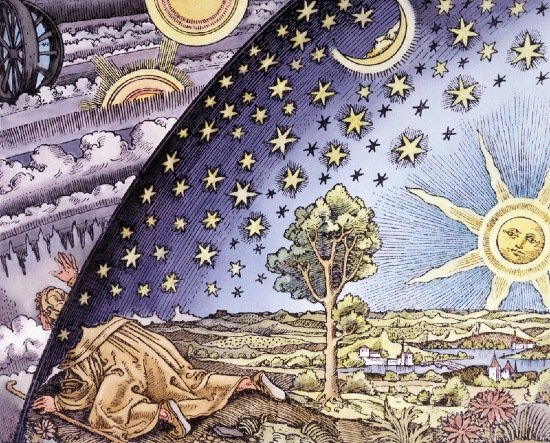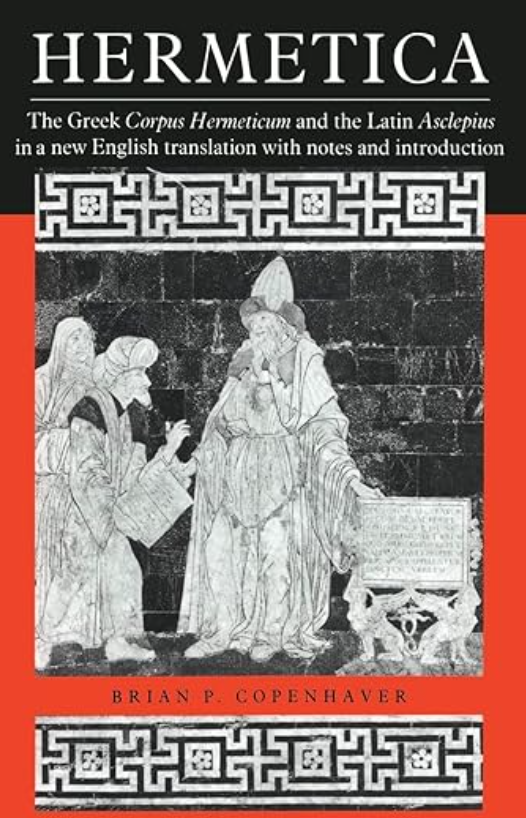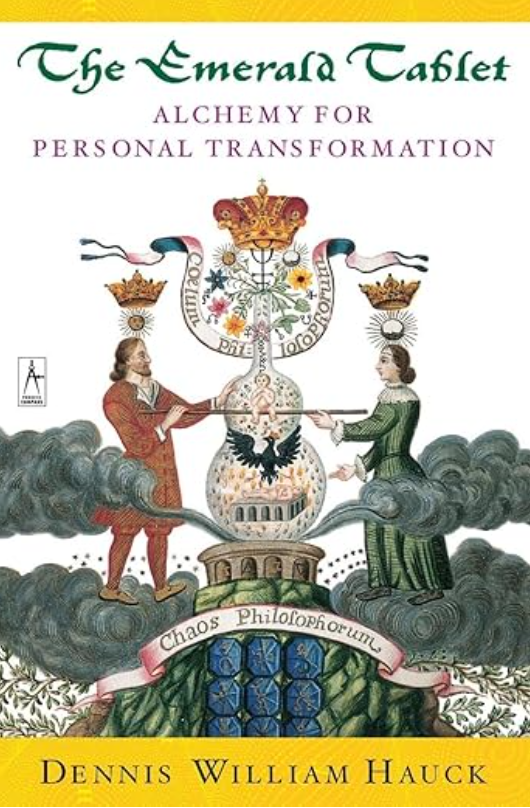
What is Hermeticism?
Long before psychology, quantum theory, self-help, even most major world religions —there was Hermeticism.
Hermeticism is an ancient philosophical and spiritual tradition that offers profound teachings on the nature of reality, the cosmos, and the inner workings of the human mind and soul.
Hermeticism is a sacred tradition that weaves together philosophy, science, mysticism, and alchemy into a unified system for understanding the cosmos and the self. This is a powerful system for those who seek personal transformation, mastery, and deep connection to the divine.
Rooted in the teachings of Hermes Trismegistus, his teachings form the basis of the Hermetic Corpus, a body of texts dating back to the first few centuries of the Common Era, written in the intellectual melting pot of Hellenistic Egypt—specifically Alexandria, a city where Greek philosophy, Egyptian ritual, and Jewish mysticism all converged. These writings—dialogues between Hermes and his disciples—explore the soul’s journey through the material world, the nature of the divine, and the path to spiritual rebirth.
At the heart of Hermetics is the belief that each person has the ability to unlock their potential and achieve alignment with the Universal Laws that govern the seen and unseen realms. Through self-knowledge, discipline, and spiritual practice, you can access higher states of consciousness, discover your purpose, and live a life that is in harmony with the universe.
Hermeticism Through the Ages: A Hidden Thread in Western Mysticism
Although often hidden from plain view, Hermeticism has quietly shaped some of the greatest minds, movements, and mysteries in Western civilization:
Its origins lie in Hellenistic Egypt, where the figure of Hermes Trismegistus emerged—revered as the original teacher of alchemy, astrology, healing, and divine wisdom. The Hermetic Corpus became a cornerstone for those seeking to understand the nature of the soul, the mind of the cosmos, and the divine blueprint of reality.
As the Roman Empire faded, the flame of Hermetic knowledge was kept alive in the Islamic Golden Age, where Arab philosophers and scholars translated these texts and integrated them with cutting-edge insights in astronomy, medicine, and metaphysics. For these thinkers, Hermeticism was not superstition—it was essential to understanding the hidden forces of the universe.
During the Renaissance, Hermeticism ignited a bold intellectual and spiritual revival. In 1463, Marsilio Ficino translated The Corpus Hermeticum into Latin, and philosophers like Giordano Bruno and Pico della Mirandola integrated Hermetic ideas into their bold visions of a cosmos animated by divine intelligence. These were not fringe mystics—they were central figures reshaping the Western worldview.
Even Sir Isaac Newton, often remembered solely as a rational scientist, spent years studying alchemy and Hermetic texts in private. Widely regarded as the father of modern science, it’s said he devoted more time to studying alchemy and Hermetic texts than to physics. For Newton and many of his contemporaries, science and spirituality were two sides of the same coin—both seeking to uncover the divine laws that govern creation.
Later, in the 19th and 20th centuries, Hermetic principles were woven reemerged through the works of Eliphas Levi, Madame Blavatsky, Aleister Crowley, and into the Western Mystery Traditions: Rosicrucianism, Freemasonry, Theosophy, and the Hermetic Order of the Golden Dawn. These movements brought Hermetic principles back into public awareness, blending them with astrology, Kabbalah, Tarot, and ceremonial magick.
The publication of The Kybalion in 1908 condensed Hermetic thought into a practical system of seven universal principles, still widely studied today modern spiritual seekers.
Why Study Hermetics Today?
In a world that feels increasingly fractured, Hermeticism offers a path toward inner coherence. To study Hermetics is to study the hidden structure of existence—the way thoughts become things, how energies interact, how the invisible shapes the visible. It is a path for those who seek not blind belief, but direct knowledge through personal experience.
Whether you're a spiritual seeker, an entrepreneur, an artist, or a scientist, Hermetic principles can radically transform the way you live, create, and lead. They offer:
A map of consciousness—so you can navigate inner and outer challenges with wisdom.
Clarity of purpose—as you align with the rhythms of your soul and the laws of creation.
Emotional mastery—as you understand the deeper causes behind your reactions and desires.
A sense of spiritual sovereignty—the realization that you are not a passive victim of fate, but a co-creator of your life.
This path is not about escaping the world. It’s about transforming your perception of it.
Begin Your Hermetic Journey
Hermeticism is not about adopting a new religion or replacing one you already cherish.
It’s not here to convert, contradict, or conflict. At its essence, Hermeticism is a system of thought: a framework for understanding the laws that govern the seen and unseen aspects of life. It is metaphysical, not dogmatic. It offers a universal language that speaks to the soul regardless of your spiritual background. Whether you identify as religious, spiritual-but-not-religious, or simply curious, Hermetics provides tools and teachings that complement—not compete with—your existing beliefs.
You can walk this path alongside your faith.
You can explore these teachings with reason, intuition, or both.
Because Hermeticism doesn’t ask you to believe—it invites you to know through direct experience.
To study Hermetics is to awaken the light within—to become an alchemist of your own destiny. You are invited to walk the ancient path of the magi, mystics, and philosophers who came before you, and to rediscover the divine spark at the core of your being.
Because when you truly know yourself—you begin to know the universe.
The Seven Hermetic Principles
-

Principle of Mentalism
"The All is Mind; the Universe is Mental."
-

Principle of Correspondence
"As above, so below; as below, so above.”
-

Principle of Vibration
"Nothing rests; everything moves; everything vibrates."
-

Principle of Polarity
"Everything is dual; everything has poles; everything has its pair of opposites”
-

Principle of Rhythm
"Everything flows, out and in; everything has its tides; all things rise and fall”
-

Principle of Cause and Effect
“Every cause has its effect; every effect has its cause.”
-

Principle of Gender
"Gender is in everything; everything has its masculine and feminine principles; gender manifests on all planes."
Recommended Texts for Students of Hermeticism
-

Corpus Hermeticum
A collection of dialogues between Hermes and his disciples, covering topics such as the nature of the divine, the creation of the universe, and the path to spiritual enlightenment. It explores the relationship between the divine mind and human consciousness, offering a path toward spiritual awakening.
-

Emerald Tablet
A cryptic and poetic text that contains some of the most famous Hermetic aphorisms, including "As above, so below." This phrase encapsulates the Hermetic belief in the interconnectedness of all things and the idea that the microcosm (human experience) reflects the macrocosm (the universe).
-

The Kybalion
This text presents the foundational teachings of Hermetic philosophy. It outlines the 7 universal principles that govern the nature of reality, providing insight into the workings of the universe with practical guidance for spiritual growth, self-mastery, and understanding the deeper truths of existence.
Study with an Authentic Hermetic Lineage…
The tools, healings and secrets of the ancient mystery school traditions were once veiled, known only to the privileged elite—royalty, artists, scholars.
In these remarkable times, the doors are now open to the public, with wisdom unveiled for all who seek to take the journey on the path of self-mastery that has illuminated the minds of history's brightest souls…
Leonardo DiVinci, Nicola Tesla, David Bowie… These are just some of the remarkable people who studied in the mystery school tradition.
Are you ready?
